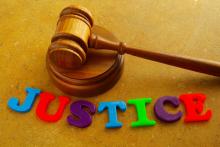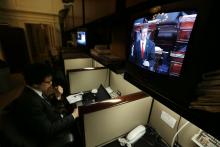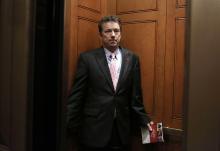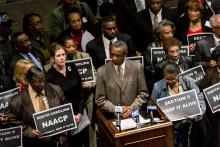Faith and Politics
OUR LIFE TOGETHER can be better. Ours is a shallow and selfish age, and we are in need of conversion—from looking out just for ourselves to also looking out for one another. It's time to hear and heed a call to a different way of life, to reclaim a very old idea called the common good. Jesus issued that call and announced the kingdom of God—a new order of living in sharp contrast to all the political and religious kingdoms of the world. That better way of life was meant to benefit not only his followers but everybody else too. And that is the point of it.
Christianity is not a religion that gives some people a ticket to heaven and makes them judgmental of all others. Rather, it's a call to a relationship that changes all our other relationships. Jesus told us a new relationship with God also brings us into a new relationship with our neighbor, especially with the most vulnerable of this world, and even with our enemies. But we don't always hear that from the churches. This call to love our neighbor is the foundation for reestablishing and reclaiming the common good, which has fallen into cultural and political—and even religious—neglect.
Judaism, of course, agrees that our relationship with God is supposed to change all our other relationships, and Jesus' recitation of the law's great commandments to love God and your neighbor flows right out of the books of Deuteronomy and Leviticus (see Deuteronomy 6:5; Leviticus 19:18). Islam also connects the love of Allah with love and responsibility to our neighbors. In fact, virtually all the world's major religions say that you cannot separate your love for God from your love for your neighbor, your brothers and sisters. Even the nonreligious will affirm the idea of "the Golden Rule": "Do to others as you would have them do to you" (Luke 6:31).
WHO SHOULD BE able to pray at a presidential inauguration and what should that prayer be?
On Jan. 20, 1937, Monsignor John A. Ryan delivered the first inaugural benediction at the inauguration of Franklin D. Roosevelt with these words: "Almighty God, ruler of nations, we beseech thee to bless the people of the United States. Keep them at peace among themselves and in concord with all other peoples. Cause justice and charity to flourish among them, that they may all be enabled to live as persons created in thine own image and likeness."
Since this first benediction, ministers, priests, bishops, cardinals, and rabbis have offered prayers at the past 18 presidential inaugurations. Almost 76 years to the day since Father Ryan's benediction, Myrlie Evers-Williams became the first layperson to deliver the inaugural invocation, and Rev. Luis León, an Episcopal priest, offered his prayer for President Obama and our nation: "... with the blessing of your blessing, we will see that we are created in your image, whether brown, black, or white, male or female, first-generation immigrant American or daughter of the American Revolution, gay or straight, rich or poor ... with your blessing we will recognize the abundance of the gifts of this good land with which you have endowed this nation."
You may remember that the selection of Rev. León, like most decisions made in Washington today, did not come without controversy and an onslaught of protests. León, who ministers at St. John's Church near the White House and is known for welcoming openly gay Christians, replaced the administration's first choice, Rev. Louie Giglio. Giglio withdrew from the ceremony after the surfacing of his controversial sermon from 20 years ago condemning gay relationships. Giglio's stance on the issue of gay marriage is in sharp contrast to the beliefs of Rev. León, whose parish will begin to bless same-sex partnerships and ordain transgender priests this summer.

WHEN POPE BENEDICT XVI unexpectedly announced his resignation in mid-February, many expressed admiration for the decision's honesty and humility, and much speculation followed about the reasons for it—and the consequences it would have.
As transition takes shape in the Vatican, Catholics around the world are commemorating the 50th anniversary of the Second Vatican Council, which took place from 1962 to 1965 and which redefined the church's relationship to the world. Vatican II's final document said: "This council can provide no more eloquent proof of its solidarity with, as well as its respect and love for the entire human family with which it is bound up, than by engaging with it in conversation about these various problems," referring in part to the "profound and rapid changes ... spreading by degrees around the whole world." Half a century ago, few could have predicted the dramatic changes that were to follow in science, technology, global integration, and social mores.
Catholics know that in the last 50 years the institutional church has been at the forefront of calls for a more just, compassionate, and sustainable world. Catholic social and ecological teaching is well developed and clearly articulated. The church has offered analysis and challenging proposals for financial reform, arms control, care for creation, and multilateral political structures of accountability in response to globalization.
We want the new pope to continue, deepen, and make much more visible—including to Catholics around the world—the church's prophetic work for social and economic justice, for environmental sustainability, and for wise, just, and inclusive peace. We want the new pope to engage the Islamic world, respectfully cooperating in response to orchestrated fear, enemy-making, and all forms of religious extremism. We want him to promote cultures of peace in a world that is increasingly violent. We want him to be open to new cosmological insights that are transforming human consciousness; shifting our understanding of earth community and of our planet's place in the vast, expanding universe; and maturing our reflections on the One who is Creator, Incarnation, and Spirit of love.

I RECENTLY FINISHED a new book, which we launch on April 1, the day after Easter. The beginning of the Easter season is a liturgically appropriate moment for the introduction of a hopeful book in what many feel is a hopeless time.
I wanted to tell you, our faithful magazine readers, why I wrote this book, and why I called it On God's Side: What Religion Forgets and Politics Hasn't Learned About Serving the Common Good.
This is not just another book for me. I wrote it during a three-month sabbatical that started in a monastery overlooking the Pacific Ocean. Every day started before sunrise with prayers, walks, yoga, and exercise, followed by writing the rest of the day. My other discipline was not to write or comment publicly on the news. I watched the nation's political discourse each night after a day of writing and found it more depressing than ever. It was an election year.
The resulting book is not about politics in the narrow sense, but about how to engage our personal and public lives with an ancient but timely idea and practice—the common good—that has long and deep historical roots across many religious faiths and secular notions of democracy. I sought to explore the biblical and theological roots of the idea, and then apply it to the most basic questions of economic trust, the role of government, civility, renewing democracy, globalization, conflict resolution in a violent world, and, of course, what our faith can contribute to the common good with the world as our parish. Most compelling, I found Jesus' call to love our neighbors to be the gospel foundation for serving the common good, and the excerpt in this issue, "A Gospel for the Common Good" (page 16), makes the case for that.
For Christians, the book explores a fundamental question: Why did Jesus come, and what do the gospel and the mission of the church really entail? The book's message is that when people of faith actually say and do the things their faith stands for, two things happen: at first other people are surprised, and then they are attracted. It examines both inspirations and practices for how we can respond to the growing hunger for a better life together and find common ground for the common good, especially in relation to those who are the most vulnerable.

Sharletta Evans of Denver says it was her faith that motivated her to forgive the teens who killed her 3-year-old son, Casson, during a drive-by shooting. When she did, Evans says, she could feel the hate evaporate from her body. She has since developed a relationship with one of the young men, whom she hopes to see released from prison.
Minnesota’s Mary Johnson drew on her faith for the strength to meet with and forgive Oshea Israel, who was 16 when he killed Johnson’s 20-year-old son, Laramiun Byrd. Mary now considers Oshea, who lives next door to her, her spiritual son. The two now frequently speak together about anti-violence and the power of forgiveness.
And Mona Schlautman, whose 15-year-old son, Jeremy Drake, was kidnapped and killed in a park in Omaha, Neb., says her faith — plus her belief that it is good public policy — have led her to support changes in that state’s laws that would ensure young people who go to prison for serious crimes have meaningful opportunities to be considered for release after they have acknowledged what they did, asked for forgiveness and sought to make amends. She testified before the Pardons Board several times on behalf of Jeremy Herman, who at 17 was convicted of kidnapping her son. He was released from prison after 19 years.
Throughout the United States, people of faith are on the front lines of the effort to replace life-without-parole sentences for children with age-appropriate accountability measures that focus on rehabilitation and reintegration into society. The Juvenile Justice Week of Faith and Healing is an annual event intended to engage faith leaders and further increase awareness of individual, community and social needs arising from the current juvenile justice system.

President Barack Obama is planning to visit Bethlehem and the Church of the Nativity as part of his visit to Palestine/Israel. The Church of the Nativity, of course, is not the only thing to see in Bethlehem. I suggest that as the president enters the town, from Jerusalem I presume, that he takes a look to his right, and he will see the separation wall. It is hard to miss. It is that ugly concrete structure that gives you the impression that you are inside a big prison. I am sure the president will notice how the wall is killing life in Bethlehem, cutting deep into our neighborhoods.
As he continues on his way through the main street, I suggest he pays attention to his right, to the Azza Refugee Camp. I hope it reminds him of the misery of more than 5 million Palestinian refugees today, who are still waiting in hope for a just resolution to their suffering.

I have often wondered about the trajectories my life has taken. I was raised a Latino Pentecostal in New York City but educated in a liberal arts tradition at Columbia University in Manhattan. I was exposed to evangelical and then liberal Protestant traditions in seminary and graduate school. My theological views have changed over the years. I have moved from Pentecostal to Baptist to Congregational (United Church of Christ) church traditions.
Yet at each step of the way, I have been able to build on the solid foundations of the past in moving to new understandings for the new circumstances in my life. These life transitions never started from “scratch.” Some of these same tensions might have motivated Paul in considering, at least rhetorically, his past a “loss” in comparison to a new way of living and being in Philippians 3:4b-14.
...
In these days, what are the sources of such life-altering “new knowledge?” There are many places for us to turn. Though I grew up without guns, I was surrounded by plenty of gun violence in my inner city neighborhoods in the Bronx and Brooklyn. In the aftermath of the tragic losses of our children and educators in Newtown, Conn., I wonder if we have gained any new knowledge. Apparently, we live in a country that values the freedom to own guns, even overly powerful ones like assault rifles. “Second Amendment rights” are invoked as if our founders could predict the kinds of weapons that would be available to regular Americans today, even with the “militia” (local police forces) that we also have available to us.
The White House announced today the appointment of Melissa Rogers as new director of its Office of Faith-Based and Neighborhood Partnerships. In a statement, former director Joshua DuBois called Rogers a "leader on religion and public life" and a "stalwart advocate for religious freedom." He added:
Melissa is also a committed Christian and lifelong Baptist. She is active in her local church – I know that Melissa has taught youth Bible study, she and her family volunteer with the church food pantry, and she takes care of infants in the church nursery – and she truly cherishes the role of people of all faiths and belief in American public life.
Sojourners president and CEO Jim Wallis released the following statement:
I’m privileged to know Melissa Rogers as both a valued colleague and a friend. Over the course of her career she has distinguished herself by her ability to thoughtfully and knowledgeably bring her faith and her understanding of the law to bear on important questions of public policy. Her genuine spirit and concern for others has earned her the trust of people on different sides of issues. Her deep competence on legal and policy matters will be very helpful in her new role. She will serve both the White House, the country, and the faith community well in this new position. I can't think of anyone who would have been a better choice for this key job at this critical time. Melissa is widely respected and trusted in the faith community, and many of us will support and assist her in any ways we can. Good choice, Mr. President!
When Ugandan parliament member, David Bahati, introduced the so-called “Kill the Gays Bill” in 2009, many Americans were shocked, including a group of 60 ecumenical Christian leaders who released a statement deploring the bill.
But as Frank Mugisha told Sojourners magazine earlier this year, what is perhaps more upsetting, albeit little known, is the level of influence American evangelicals have had in crafting Uganda’s violent homophobia.
Academy Award-winning director Roger Ross Williams hopes to put this issue front and center with his new film God Loves Uganda, which made its Washington, D.C., premiere Tuesday night at the Human Rights Campaign headquarters.
The film opens with Rev. Kapaya Kaoma, an Episcopal priest from Boston by way of Zambia, who went to Uganda in 2009 to study the relationship between American conservatives and the Ugandan people. What he found was that “religion was being used to demonize and even to kill.”

I just spent a wonderful and encouraging weekend with a church leadership team from Reisterstown, Md. I came away filled with hope for this congregation and with admiration for their clergy and lay leaders.
I wish our weak and tiresome political leaders in Washington and state capitals could visit this church in northern Baltimore County and see how mature adults of diverse backgrounds and viewpoints manage to put the congregation first.
They listened, spoke without barbed words and without aggression garbed in niceness.
They voiced their dreams, heard their differences, and then allowed a consensus dream to emerge. They understood the need to move on from yesterday. They were like two healthy parents trying to work a family problem. They seemed to trust each other.
It’s been 50 years since several significant events of the civil rights movement of the 1960s occurred, yet our society is still plagued with systemic racism. It’s been almost 150 years since we abolished slavery in this country, yet many are still enslaved daily by the oppression of discrimination and poverty. While significant strides in equality and justice have taken place, new systems of injustices have been instated and threaten the integrity of our much-stated rights of “life, liberty, and the pursuit of happiness.”
I am most presently thinking of the system of the “New Jim Crow,” something author and advocate Michelle Alexander has awakened society to with the recent publication of her book with that title. The New Jim Crowrefers to the web of injustices related to mass incarceration and the stripping of basic rights of returning citizens reminiscent of the Jim Crow laws of our nation’s history. Today, returning citizens face “legalized discrimination” from employers and landlords, making it extremely difficult for them to get a job or a place to live. Additionally, in many states they are not allowed to sit on a jury or express their right to vote, meaning their voices are stifled.
Muslim and civil rights organizations say a New York Police Department program to secretly monitor Islamic communities has created so much fear and suspicion among Muslims that many find it impossible to lead normal lives.
A new 56-page report, “Mapping Muslims: NYPD Spying and its Impact on American Muslims,” details how the NYPD’s covert surveillance caused Muslims to refrain from activism and change their appearance so as not to appear too Muslim, and sowed suspicion among community members.
As a result, the Monday report asserts, trust between Muslims and police has broken down. The program, in which NYPD policemen secretly visited mosques, Muslim-owned businesses, and student and civic associations beyond New York’s five boroughs, was established in 2001 but uncovered by The Associated Press in 2011.
A spokesperson for the NYPD did not respond to a request for comment.
On March 7, 1965, 600 people began a march toward Montgomery, Ala., from Brown Chapel AME in Selma. The group, let by civil rights activists like now-Congressman John Lewis and Rev. Hosea Williams, were stopped by state troopers on horseback. When the marchers refused to back away — standing their ground on the Edmund Pettus Bridge — the troopers attacked, beating, trampling, and tear gassing the participants.
Today, that bridge made famous on Bloody Sunday, was declared at National Historic Landmark, along with 12 other sites, by U.S. Secretary of the Interior Ken Salazar.

While I stand with Sen. Rand Paul on the question of the use of militarized spy drones in American airspace and (potentially) on Americans, I am deeply troubled by our use of these weapons in other lands, too, where they are responsible for the deaths of hundreds of children and other innocents.
There's something dishonorable about killing without the risk associated with the act, no matter how heinous the target or valuable and beautiful the persons you put at risk in order to personally kill.

“I believe the sequester is a pittance.”
Those were conservative Sen. Rand Paul’s words in an opinion piece this week about the sequester – severe and arbitrary cuts to the federal budget that Congress did nothing to stop. We could give him the benefit of the doubt and assume he hasn’t seen the numbers:
- The nutrition program for women with children — WIC — will have to turn away 600,000 to 775,000 women, many of whom have young children.
- The 3.8 million currently unemployed workers will have their support cut by 11 percent.
- 100,000 low-income families will lose their housing vouchers.
- 125,000 individuals and families are now at risk of homelessness.
That doesn’t sound like a “pittance” to me.
On Monday, Olivier De Schutter, U.N. special rapporteur on the right to food, submitted his report Gender and Food Security to the U.N. Human Rights Council, adding to the mountains of evidence that if you empower women with education and independent rights, they can substantially, cost-effectively, and generationally reduce hunger and malnutrition. The Guardian's Poverty Matters Blog reported:
The notion that gender equality can play an important role in reducing hunger and malnutrition has gained increasing traction in development circles. The UN's Food and Agriculture Organisation claimed in its 2010-11 State of Food and Agriculture report that equal access to agricultural resources could reduce world hunger by 12-17%. Gender and food security also came under the spotlight in the 2012 edition of the World Bank's flagship annual report, where it was argued that parity in areas including landrights, employment and political representation could improve development outcomes.
These ideas are not new. Obliged to raise children, care for sick and elderly people, and run households – work that, valued in monetary terms, would be equivalent to 15% of GDP in low-income countries, rising to 35% in middle-income countries – it has long been argued that women are being denied education opportunities, marginalising them both economically and politically. The challenge lies in convincing policymakers to do something about these multiple challenges.
Says De Schutter:
"We must address how gender roles are being defined within the family and who makes the decisions in government. ...We must refuse to take existing gender roles as givens, and instead allow women to shift the burden to men;where possible, giving women access to more opportunities and better training and education, and exposure to something other than the traditional responsibilities they have been assuming."
"If local NGOs and women's organisations and unions mobilise, using the report to put pressure on the government from below, that will be even more effective than international pressure."
This past weekend, The Faith and Politics Institute led a three-day Congressional trip to visit Civil Rights landmarks across Alabama — from Tuscaloosa to Birmingham to Montgomery to Selma. It was an incredibly moving, emotionally exhausting, soul-quenching pilgrimage as we journeyed along with heroes of the Civil Rights movement and experienced their stories.
One such hero is Congressman John Lewis. A highlight of the trip for me is recorded at the jump.
This year marks a long list of anniversaries in our nation's long march for civil rights: We now mark 150 years since the Emancipation Proclamation; and 50 years since the Stand in the Schoolhouse Door, Martin Luther King, Jr.'s "Letter from Birmingham Jail," the March on Washington, the bombing at Sixteenth Street Baptist Church that killed four little girls, and the murder of Medgar Evers in his driveway.
In remembrance of the sacred journey, The Faith and Politics Institute's Civil Rights Pilgrimage drew more than 250 people, including 30 members of Congress, for a three-day tour of civil rights landmarks and first-hand testimonies from the movement's leaders. Throughout the pilgrimage — moving from Tuscaloosa to Birmingham to Montgomery to Selma — the delegation learned, grew, and continued the conversation together: white and black, Republican and Democrat, man and woman, senior and child. We all returned to Washington, D.C., and to our homes across the country, with a renewed sense of responsibility for the common good.
A number of events made the term 'reconciliation' mean more than the definition I had somehow created for myself over the past 30 years. Reconciliation is calling the person who beat and humiliated you 'brother.' Reconciliation is sharing a platform, sharing a deeply intertwined story — and sharing an authentic embrace — with the offspring of your parents' enemies.
[Photo Gallery at the jump.]

WASHINGTON — A bronze statue of civil rights heroine Rosa Parks was unveiled at the U.S. Capitol Wednesday, a day for members of her African Methodist Episcopal Church to celebrate one of their own.
President Barack Obama, capping an hourlong ceremony in Statuary Hall, recalled the desegregation of public buses in Montgomery, Ala., after a yearlong boycott that was sparked by Parks’ simple act of defiance: refusing to move to the back of the bus.
“And with that victory, the entire edifice of segregation, like the ancient walls of Jericho, began to slowly come tumbling down,” he said before hundreds gathered just outside the Capitol Rotunda.
As Parks was hailed for her civil rights achievements, members and leaders of her African Methodist Episcopal Church celebrated Parks taking her place among the monuments to American icons from every state and walk of life.
Parks was a stewardess, who helped with Communion and baptisms in her local AME congregation in Detroit, and also a deaconess, the highest position for a laywoman in the denomination. She died in 2005 at age 92.

I was on the airplane, looking forward to reading Taylor Branch’s new book, The King Years: Historical Moments in the Civil Rights Movement. As I opened my Kindle, I realized that it offered large excerpts of Branch’s previous works, and was glad that while I have the other books in hard cover, I had these stories in my Kindle. But as I re-read some of the accounts, I realized that my 40-something-old self reacted differently than when I first read some of the accounts when I was 20-something. My younger self yearned to know: How did they organize? How did they deal with differing motives and different movements? And I yearned to believe that I, too, would have sacrificed my being for “The Movement.”
My late 40-something-old self read these words as a mother — as someone who understood the fury of the parents who were scared as their children sacrificed their very lives for justice’s sake.